Shaping Climate Futures: The Social Drivers of Deep Decarbonization
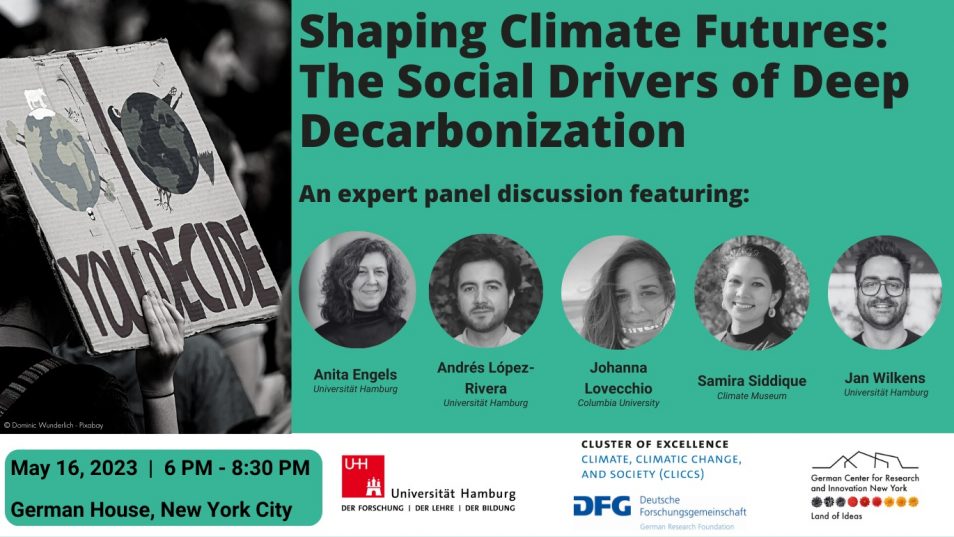 © DWIH New York
© DWIH New York
Universität Hamburg and the DWIH New York were happy to organize this panel discussion with experts from Germany and the US about the role of climate justice and social inequalities in societal transformations towards deep decarbonization. The speakers invited the audience to actively engage and share their own involvements and expectations with climate change.
In a new study from Universität Hamburg’s (UHH) “Cluster of Excellence Climate, Climatic Change, and Society” (CLICCS) (funded by the German Research Foundation – DFG) researchers found that keeping the 1.5°C temperature target is currently not plausible.
The researchers came to this conclusion by analyzing social drivers and physical processes, taking disruptive events into account, such as the COVID19-pandemic and Russia’s invasion of Ukraine. The study finds that social drivers play a key role in decarbonization, but they are currently insufficient to reach deep decarbonization by 2050, which is necessary to attain the Paris Agreement temperature goals.
Physical tipping points have limited influence on these temperature goals but are important in shaping the conditions for life on Earth. The study thus argues that desirable climate futures will only become plausible through multiple societal transformations. The panelists at the event will discuss the plausibility of and ways forward to shape desirable climate futures.
Event Information
May 16, 2023, 6:00 PM to 8:30 PM
German House, New York City
Organizer(s): Universität Hamburg, CLICCS: Climate, Climatic Change, and Society, German Research Foundation (DFG), DWIH New York
Our Speakers
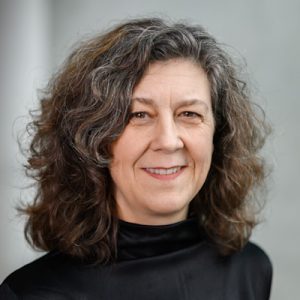
Anita Engels is a sociologist interested in climate change and social transformation. Her research covers company responses to a carbon-constraint business future as well as dynamics of climate governance at the municipal level. She invests much time in inter- and transdisciplinary research.Anita Engels, Professor for Sociology, especially Globalisation, Environment and Society, Universität Hamburg
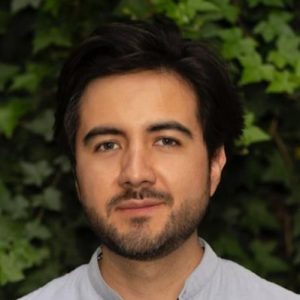
Andrés López-Rivera is a political scientist who specializes in climate change. His research focuses broadly on the intersection of knowledge politics and socio-environmental conflicts in global climate governance. He is currently doing postdoctoral research at the Cluster of Excellence Climate, Climate Change and Society (CLICCS) at Universität Hamburg. His current work advances an integrative approach to the study of social change in climate research.Andrés López-Rivera, Postdoctoral Researcher, Cluster of Excellence Climate, Climate Change and Society (CLICCS), Universität Hamburg
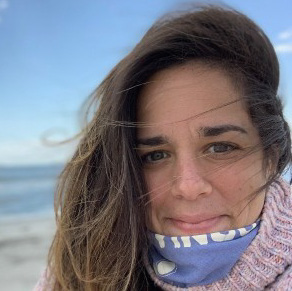
Johanna Lovecchio is the Director of Program Design for Climate Action at the Climate School at Columbia University. She specializes in climate adaptation planning, policy, and project design that is forward-looking and conscious of community-based and ecosystem resilience and climate justice. As a part of her role, she delivers strategic support, technical design and climate systems research, and local workshops to advance climate action and resilience project design and implementation in partnership with local governments and civil society around the world. Prior to joining Columbia Climate School, Johanna worked as the Associate Director of the Center for Resilient Cities and Landscapes in GSAPP, where she ran the Resilience Accelerator program. Prior joining Columbia, she was Senior Analyst and Program Manager at HR&A Advisors, where she scaled resilience capacity-building models, including the National Disaster Resilience Competition and Global Resilience Academy programs, developed city- and district-wide climate adaptation plans, such as the Lower Manhattan Climate Resilience Study, and supported the design and evaluation of transformational urban resilience infrastructure investments. As City Planner at the New York City Department of City Planning, she researched planning opportunities in post-industrial, waterfront communities impacted by Hurricane Sandy. Johanna holds a Masters of Urban Planning from the Robert F. Wagner School of Public Service and dual Bachelor of Arts degrees in Environmental Studies and Metropolitan Studies from the New York University College of Arts and Sciences. She is a frequent guest speaker and her favorite part of her job is learning from and with her students as Adjunct Faculty at the Climate School. She spends every moment she possibly can by, on, or in the ocean.Johanna Lovecchio, Director of Program Design for Climate Action, Climate School, Columbia University
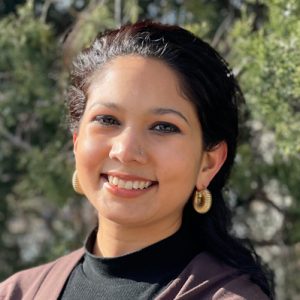
Samira Siddique, PhD (she/her) is a Mellon Foundation Postdoctoral Fellow in Climate and Inequality at the Climate Museum. She develops public programming on climate change justice that supports people in understanding how personal experiences of power and inequality shape broader relationships with society and the environment. She is passionate about the human rights dimensions of climate change displacement, which she’s explored most recently through her work on the humanitarian politics of the Rohingya refugee camps in Bangladesh. She received her PhD from the Energy and Resources Group at UC Berkeley, where she was a National Science Foundation Graduate Research Fellow, and her BA from Wesleyan University in the College of Social Studies and College of the Environment. She is a Public Voices Fellow with the Yale Program on Climate Change Communication and the Op-Ed Project.Samira Siddique, Mellon Foundation Postdoctoral Fellow in Climate and Inequality, Climate Museum

Jan Wilkens is a political scientist and with a research focus on climate justice, energy transition, and the role of technology in the Middle East. He has followed the climate conferences in Glasgow and Sharm el-Shaikh. Conceptually he works on the intersection of norms, contentious politics, and climate justice in international relations. This interest is specifically informed by bringing together constructivist and postcolonial scholarship. Photo Copyright: Esfandiari / UHHJan Wilkens, Postdoctoral Researcher, Cluster of Excellence Climate, Climate Change and Society (CLICCS), Universität Hamburg
